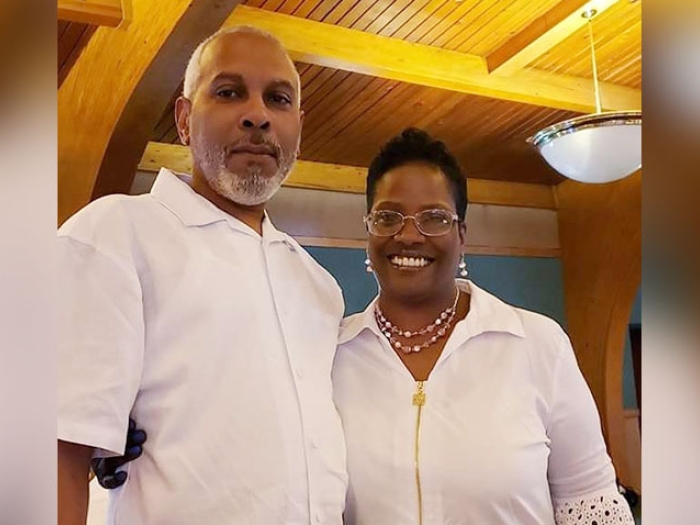Each diagnosed with the disease, the Michigan spouses have spent years advocating for others — and talking openly about their own challenges and triumphs.
7:00 AM
Author |

Dan and Jennifer Digmann are extraordinary in many ways, including their commitment to educating and supporting those with multiple sclerosis (MS).
It's a subject the spouses know firsthand: Both are living with the disease.
MORE FROM MICHIGAN: Sign up for our weekly newsletter
The couple first met in 2002 at a National Multiple Sclerosis Society event in Frankenmuth, Michigan. Friendship led to love, followed by marriage three years later.
Although each has a different type of MS, they share the same dedication to helping others with the disease. By sharing their story with others, they want to dispel misconceptions about the disease and offer hope.
"There's so much more to all of us who are living with MS," says Jennifer. "We're living our lives, in spite of our disease."
Types and symptoms of MS
MS is a disease that affects the brain and spinal cord — the central nervous system — often resulting in problems with muscle control as well as strength, vision, balance and sense of touch.
SEE ALSO: What You Should Know After a Multiple Sclerosis Diagnosis
According to Michigan Medicine neurologist Tiffany Braley, M.D., M.S., who treats Jennifer and Dan, "MS is the most common cause of nontraumatic disability among young adults. As in Jennifer's and Dan's cases, this condition often affects people in the prime of their lives."
Diagnosed in 1997 at age 23, Jennifer has secondary-progressive MS. Dan, who received his diagnosis three years later at age 27, has relapsing-remitting MS.
People with relapsing-remitting MS experience symptoms that periodically flare up but then subside. Symptoms vary, depending on which region of the nervous system is affected. The cycle can occur for years.
Over time, some of those patients may eventually develop secondary-progressive MS. They experience symptoms that develop insidiously over months to years — including progressive weakness, balance and coordination problems and cognitive dysfunction — that coincide with damage to the central nervous system.
A primary-progressive subtype of MS also exists. Absent of previous relapses, it causes an insidious progression of neurological symptoms from the start.
"No two cases of MS are alike," says Jennifer. "One type of treatment works for Dan while another works for me."
Jennifer is treated with a twice-yearly infusion of a drug called Rituxan, while Dan found success with injectable beta-interferon therapy to help reduce the frequency and severity of relapses.
"To forestall relapses and prevent or slow progression of disability, long-term immunotherapies (also known as disease-modifying therapies) are recommended," says Braley, the Digmann's neurologist. "Additional treatments are also often necessary to manage current symptoms."

One story, many platforms
The couple have faced their diagnoses head-on — and, by choice, in the public eye.
They've shared their story in a 2011 book, "Despite MS, to Spite MS," and write about personal triumphs via their blog. They also host an online radio show, "A Couple Takes on MS," for the MS and Me Radio Network.
A testament to their commitment, the two were inducted into the National Multiple Sclerosis Society's Volunteer Hall of Fame for Advocacy in 2015.
The couple attended Central Michigan University, in Mount Pleasant, Michigan; both earned graduate degrees in humanities. They have remained residents in this small college town to be close to friends and relatives. Jennifer's condition requires more assistance as she has limited use of her legs and hands.
Self-proclaimed "fighters," Dan and Jennifer feel fortunate to have each other and their support system nearby.
"It's a frustrating disease," says Dan. "It's also an isolating disease, so it's important to have a community. It can get tough, but our family and friends are always there to support us."
SEE ALSO: Easing MS Brain Fog with Sleep Apnea Treatment
Because there is no cure for MS, the couple say their goal is to manage their symptoms.
But they're also hopeful about advances in MS treatment. "When we were diagnosed, there were only three treatments," says Dan. "Today, 20 years later, there are 14."
Braley supports their optimism: "For the last 20 years, and especially over the last decade, we have seen a rapid expansion in the number of treatment options for MS, including more effective options to control the disease," she says.
As a designated Multiple Sclerosis Collaborative Research Center, the Michigan Medicine MS Center is actively involved in clinical trials to evaluate the next generation of MS therapeutics.
"Additional promising therapies that are currently being studied in clinical trials will likely broaden the treatment landscape even more over the next few years," Braley says.
Living with pride and positivity
Dan and Jennifer recently returned from the National MS Society Public Policy Conference in Washington, D.C., where they met like-minded advocates from around the world — a trip that aligns with their longtime mission.
"We advocate for issues that impact the MS community," says Dan. "We are absolutely passionate about this and about helping others with MS. We want to be their voice. When we were diagnosed, there weren't a lot of positive voices out there about living with MS.
"We want to show that we're still active, vital members of the community."
To make an appointment at the Michigan Medicine Multiple Sclerosis Center, call 734-936-6727.

Explore a variety of healthcare news & stories by visiting the Health Lab home page for more articles.

Department of Communication at Michigan Medicine
Want top health & research news weekly? Sign up for Health Lab’s newsletters today!





